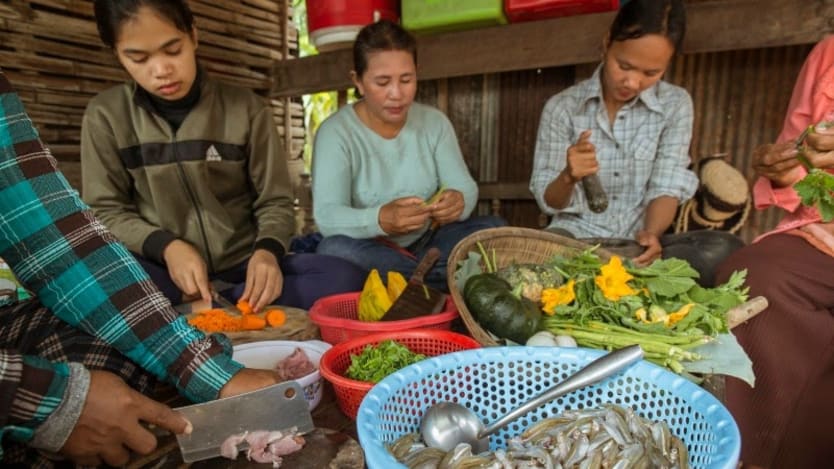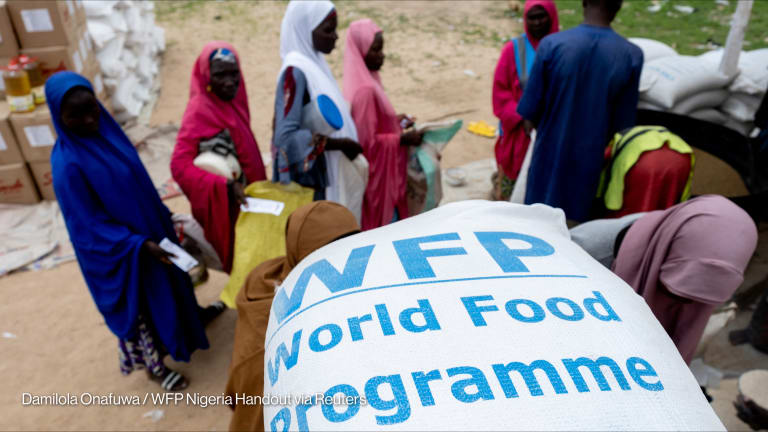
WASHINGTON — COVID-19 demonstrates the dangers of a fragmented global food system, said United Nations Committee on Food Security Secretary Chris Hegadorn.
CFS, an intergovernmental platform that began within the Food and Agriculture Organization in 1974, is responsible for developing and endorsing global policy recommendations and guidance on food security and nutrition. Better unifying the food system across sectors is the goal of the organization's “Voluntary Guidelines on Food Systems and Nutrition,” a document it began developing in 2017 and will finalize in October.
The pandemic has made this work even more timely, Hegadorn said.
“There’s just a widespread recognition that action has to be taken,” Hegadorn said.
To develop the guidelines, CFS convened consultations in Rome with U.N. agencies as well as with other stakeholders in six regions around the world. Now, negotiations are underway to finalize the document before it’s presented for endorsement at CFS 47 in Rome in October. Hegadorn said it’s not yet decided whether that event will go ahead as planned, or be conducted virtually. It could also get pushed into next year, he said.
In-depth for Pro subscribers: Q&A: How innovation can help end hunger
The COVID-19 crisis makes scaling food security solutions more critical than ever, says Bernhard Kowatsch, head of the World Food Programme Innovation Accelerator.
The process aims to make policy recommendations for how different sectors — such as agriculture, health, education, water and sanitation, trade, and gender — can come together to address multiple causes of malnutrition. This includes both undernutrition, like micronutrient deficiencies, and overnutrition, like obesity.
“What’s different about the guidelines is that they’re focused on not food production or fisheries or seeds or any one or two certain, specific areas. This is a comprehensive approach,” Hegadorn said. “We’re hoping these guidelines reduce policy fragmentation between sectors with of course the emphasis on food, agriculture, and health, while also addressing livelihoods and environmental sustainability.”
“What makes CFS unique is it’s the only platform of its type in the U.N. that captures all of the players in the same process outside a convention or a treaty.”
— Chris Hegadorn, secretary, United Nations Committee on Food SecurityHegadorn spoke to Devex about why CFS is uniquely positioned to guide this policy reform and how the guidelines connect with other U.N. initiatives such as the 2021 Food Systems Summit.
This conversation has been edited for length and clarity.
Why is now the time for these voluntary guidelines?
If you’re tracking the food security portfolio, then you know that this is all the rage. It’s being talked about in pretty much every webinar, every meeting on food systems and food security and nutrition around the globe, whether it’s the New York High-Level Political Forum or the EAT Forum in Stockholm — you name it. The Nutrition for Growth Summit. People recognize that food systems are out of whack.
There’s a growing recognition that growing or producing a certain number of calories is not addressing the more complex issues involved in hunger and malnutrition. It's about getting not just calories but high quality foods, nutrients, and minerals at the right times to reduce stunting, to reduce wasting, to reduce starvation.
There also has to be a recognition of food and food production’s impact on the environment, on natural resources, on carbon capture, carbon emissions. And then all the other issues involved in human health in terms of reducing to the extent possible the food and diet related NCDs that are wreaking havoc around the world.
Why is the Council on Food Security best placed to tackle this?
What makes CFS unique is it’s the only platform of its type in the U.N. that captures all of the players in the same process outside a convention or a treaty. We have a comprehensive approach, we have an open membership that captures the broad assortment of U.N. players, civil society, private sector, research, foundations. It is very unique. No one else can do that.
You get a great amount of energy at events like the Stockholm Food Forum where you have a lot of smart people, movers, and shakers. But they don’t have the weight of the U.N. behind them. They don’t have the weight of the member states who are the backbone of the CFS. It’s one of a kind, and that’s why it’s so important to the global food security community.
How are you making the guideline development process COVID-19 sensitive?
Nobody predicted the COVID-19 crisis nor the extent of its impacts, especially on incomes dropping and the access and affordability issues being so affected for so many. But it highlights to many exactly why it’s so important to be working to reform and transform food systems.
The 2030 agenda talks about transformative approaches. It’s all about making the changes systematically, holistically to address all of the complex issues in the food security world, in the malnutrition world. You can’t isolate out food production without considering the impacts on the environment, on health, on all the complexities. COVD-19 does make it a challenge, but we anticipate these guidelines to be useful for years to come.
We are talking about how the guidelines can incorporate new text around COVID-19, in fact, that’s on the agenda of our bureau meeting in early June. We have some ideas of text additions that can address this. We will have quite a number of discussions when we have our plenary, whether that’s October, or delayed. It’s on everybody’s minds.
It adds another element of urgency to the work.
Absolutely. It does raise major complexities for us, too, because at the end of the day this is a political process with a spectrum of views about what’s causing the issues that we’re addressing and what are the right solutions. There are those who believe technology and innovation is the way out, that we just have to invent something that will solve the world’s hunger problems a la the Green Revolution.
There are others who think that fundamental systems in the major food-producing countries and regions are part of the problem; that they are not addressing sustainability issues, be it economic or social or environmental. It’s a complex process that’s just been made more complex. But we’ll get there.
Once the guidelines are released, what is CFS’ role in implementation?
In reality, we have, as a secretariat, a very limited ability, a very small staff. We do not do implementation. We’re not an implementing organization. We rely on our members to take forward implementation, utilization, what we call “uptake.”
For example, the “Voluntary Guidelines on the Responsible Governance of Tenure” have become the major global instrument around the governance of tenure. Countries who are signatories utilize that document as the way to move forward on governance of tenure. We hope the voluntary guidelines will have similar clout. We’re working already with the Japanese government to highlight the guidelines in their Nutrition for Growth Summit. We have been talking and working with Dr. Agnes Kalibata and her team on the Food Systems Summit.
We see the Food Systems Summit as a force multiplier that with the voluntary guidelines finalized we’ll be able to amplify the messages. They’re looking for this type of legitimate product that addresses all those issues that we’ve discussed.
Search for articles
Most Read
- 1
- 2
- 3
- 4
- 5








